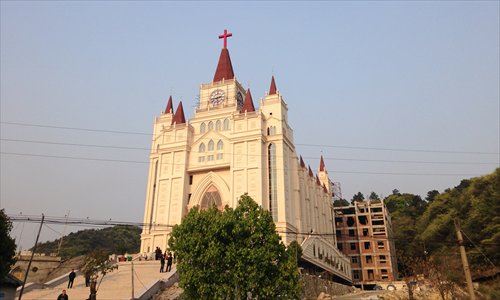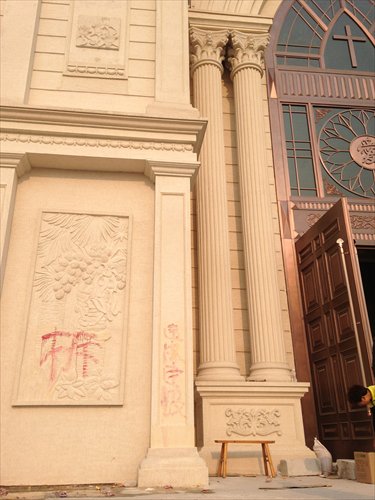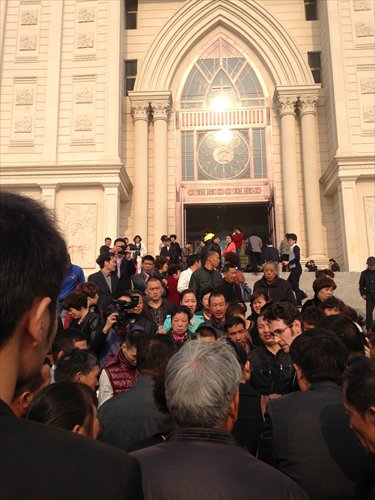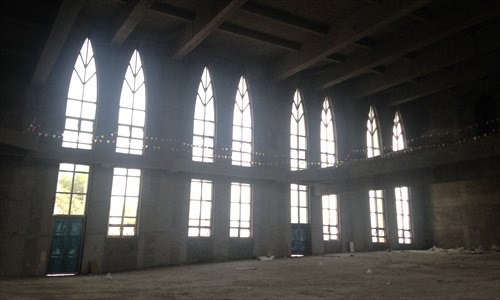Concern rises in Wenzhou as Christianity booms in capitalist fashion

Sanjiang Church under construction. Photo: Zhang Yu/GT
Freshly daubed in red paint on the left façade of Sanjiang Church in Yongjia county, Wenzhou, in China's eastern Zhejiang Province, is a large Chinese character chai, meaning "to demolish."
A symbol of China's rapid urbanization in the past three decades, the same character has been painted on the walls of old neighborhoods, factory buildings and illegal structures all over China before they made way for new high-rises, highways and commercial complexes.
But a province-wide controversy was triggered when the same fate befell the brand new Protestant church early this April, in a city where the large Christian population, about 15 percent of a total of 9 million, has provided the nickname "China's Jerusalem."
The local government has ordered the gigantic church, rising over 50 meters from a stretch of farmland, and one-storey houses to be dismantled. Construction of the Gothic-style church, with its pointed arches, ornate façade, high spire and pinnacles, has already cost more than 20 million yuan ($3.2 million) over three years and is still ongoing.
The local Yongjia government called the church a "model project" just last September. Now it is declaring it illegal.
Not far away, modern skyscrapers, which form the zigzagging skyline of Wenzhou's city center, rise on the other side of the Oujiang River which separates Yongjia county from downtown Wenzhou.
Just 50 meters away from the church, a highway is being built, and an ambitious 20-billion-yuan commercial project aimed at "turning southern Yongjia into Wenzhou's Pudong New Area" has just started.
Sanjiang Church is not the only church that is the subject of a demolition order.
According to local Christians, from late March, at least eight churches in Wenzhou and several in the rest of Zhejiang Province have received written or oral orders from local governments to either dismantle buildings or remove crosses.
Local Christians believe this is a demolition campaign targeting Christianity. After Sanjiang Church received the demolition order, thousands of Protestants from Yongjia and other parts of Wenzhou, who heard the news from church members or through social media, flocked to Yongjia to protect the church.
"Wenzhou's officials have always been very tolerant toward Christianity. We think this is an order from the provincial government," Martin Xu, a local Christian businessman, told the Global Times. His view was shared by many Christians at the site.
Some drew up a petition to the provincial government of Zhejiang, calling for it to cease removing crosses and dismantling churches.
"The government should protect people's right to freedom of religion, as is granted by the Constitution," the petition read.
Over 1,000 pastors in Wenzhou's churches and hundreds of Protestants in China and abroad have signed the petition, Zheng Leguo, the Wenzhou preacher who drafted the petition, told the Global Times.

The Chinese character chai on the wall of Sanjiang Church. Photo: Zhang Yu/GT
Legal destruction
Officials from Wenzhou's Three-Self Patriotic Movement (TSPM), China's government approved Protestant church, however, do not share the indignation of local Christians.
Most of the churches facing demolition orders, including Sanjiang, are registered under the TSPM, while others are underground churches, also known as house churches.
"All the orders were issued in accordance with Zhejiang Province's 'three revise and one demolition' campaign. The governments' actions are completely legal," an official with TSPM, who refused to be named, told the Global Times in a phone interview.
According to an official document issued by the People's Government of Zhejiang Province in February 2013, "three revise and one demolition" is a three-year campaign aimed at hastening urbanization and "building a more beautiful Zhejiang."
The document urged local governments to carry out the campaign vigorously by "revising" old neighborhoods, old industrial sites and urban villages and demolishing illegal structures by 2015. The official said the movement didn't touch upon religious buildings last year. This year religious buildings are being targeted too.
"All the churches that received demolition orders are illegal. Some have illegal structures and some were built without a permit as a religious building. To solve the problem quickly, some local governments ordered churches that do not have a religious permit to take down the crosses to avoid being too conspicuous," the TSPM official said.
"So far, no crosses have actually been taken down. We understand that crosses are a symbol of Christian belief so we are negotiating," he said.
An official with the Bureau of Ethnic and Religious Affairs of Wenzhou responded similarly.
Sanjiang Church is quadruple the size permitted by the government, and has been built on agricultural land where religious buildings are not allowed to be built, a document by the Yongjia government said.
The local government has agreed not to dismantle the entire Sanjiang Church but only remove part of its annex after negotiations with the church.

Local Christians gather at Sanjiang Church on April 4 to protect it from being demolished. Photo: Zhang Yu/GT
Oversized churches
Local Christians are not happy with the official replies.
"We admit that many churches are not completely legal. This is because the provincial government hardly ever grants permits for large churches. Since there is a need for larger churches here in Wenzhou, it's been a common practice for churches to be built larger than is permitted and local governments always cut us some slack," Zheng Leguo said.
A man in charge of a church in Haining's Dingqiao county, who was verbally asked to take down its cross, also admits the church hasn't got all the required permits.
"It takes years to finish all the applications, so we applied and built the church at the same time," the man surnamed Li said.
The national regulations state that the permit to build a church needs to be granted by the provincial government. To reach that level, an applicant has to start with the neighborhood committee or village then go up to get the approval of the county, city and provincial level religious affairs offices. Approvals from the urban planning bureaus and housing administration offices are also required.
"Basically, it takes a very long time to get the final approval of a building permit for Christian churches. It is unsurprising that, in order to meet the needs of believers, some churches start construction before receiving the final approval," said Fenggang Yang, Professor of Sociology and Director of the Center on Religion and Chinese Society at Purdue University, who has been following the incident closely on the Internet.
"Not only is it difficult to get the permit to build a new church, it is even more difficult to make renovations for the purpose of expanding the sanctuary. The government agencies are often reluctant to grant such permits," he said.
Some Christians have argued that the government has selectively implemented the law on Christian buildings since other illegal structures near the churches did not receive demolition orders.
Li Xiangping, a professor of religion at East China Normal University, said, "The written document of 'three revise and one demolition' shows no bias against religion. But in actual implementation, there might have been a bias, because orders to dismantle crosses don't seem to make sense."
Yang said, "Honestly speaking, in China today, what can you accomplish without violating some kind of rules? There are a myriad of rules, but some rules are seriously outdated, some rules are arbitrarily made, and some rules are selectively enforced."

Sanjiang Church from inside. Photo: Zhang Yu/GT
Religious business
The rapid expansion of Wenzhou's Christian population is closely connected with Wenzhou's history of entrepreneurism and status as a pioneer in economic reform and commercialization since the late 1970s, observes Cao Nanlai, an associate professor at Renmin University of China's School of Philosophy.
Cao is the author of Constructing China's Jerusalem, a 2010 book published by the Stanford University Press about Christianity in contemporary Wenzhou based on over two years' field research.
Characterized by its small to medium manufacturing businesses and private capitals, Wenzhou's commercial success was dubbed "the Wenzhou model of development" in the mid-1980s and created a new wealthy class who ran private businesses.
"Wenzhou's boss Christians ran the churches with the same philosophy as they ran their businesses. They bought and expanded churches and capital, built churches and did a great job marketing Christian ideas and church activities, which made Christianity a powerful religion in Wenzhou," Cao told the Global Times.
Also, since Wenzhou is cut off by mountains, it enjoyed a relatively high level of religious freedom and religious activities received little interference.
"Unlike in many other places in China where Christianity is marginalized, in Wenzhou it is almost mainstream. Many local officials, if they are not Christians themselves, have Christian relatives, friends and classmates," Cao said. One aspect of this is that many Christians proudly give their companies Christian names, such as the Canaan Technology Group or the Shenli (literally "God power") Group.
But just as some economists have pointed out that Wenzhou's model of development isn't sustainable, its development of Christianity has also had problems.
"The growth of Christianity in Wenzhou is in a phase when the speed and size of expansion is valued over other aspects. Local Christians built large churches and tall crosses which religiously represent blessings of God and nearness to heaven. But it's also a kind of display. Wenzhou Christians want to show how capable they are, blessed by God, and how morally superior they are to others," Cao said.
Other issues include a blurred line between private assets and church assets.
In the course of this rapid development, however, many laws were ignored, and the fact that the church put too much emphasis on using tangible aspects to attract converts instead of via theological discussions, he said.